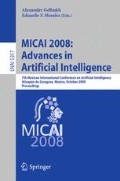Abstract
Here we present an automated mechanism used by a human coach in the decision making process to enhance teams replacing a human member with an Intelligent Virtual Agent (IVA). The IVA called PANCHO (Pedagogical AgeNt to support Collaborative Human grOups) will join the human group with the aim of improving the performance of the team —inspired by the Team Roles Theory— and providing scaffolding to the trainees during the task execution. PANCHO´s architecture —an emotional architecture— is also described briefly.
Access this chapter
Tax calculation will be finalised at checkout
Purchases are for personal use only
Preview
Unable to display preview. Download preview PDF.
References
Rickel, J., Johnson, W.L.: Virtual Humans for team Training in Virtual Reality. In: Proceedings of the 9th World Conference on AIED, pp. 578–585 (1999)
Aguilar, R.A., Troncoso, B., de Antonio, A., Imbert, R.: Intelligent Virtual Environments for Training: A Tutoring Approach. Research in Computing Science 27, 169–179 (2007)
Belbin, M.: Management Teams. John Wiley & Sons, New York (1981)
Belbin, M.: Team Roles at Work. Butterworth-Heinemann Ltd., London (1993)
Bean, J.C.: Engaging ideas: the profesor’s guide to integrating writing, critical thinking, and active learning in the classroom. Jossey-Bass, San Francisco (1996)
McGath, J.E.: Groups: Interaction and Performance. Prentice Hall, New York (1984)
Imbert, R., de Antonio, A.: When Emotion Does Not Mean Loss of Control. In: Panayiotopoulos, T., et al. (eds.) IVA 2005. LNCS (LNAI), vol. 3661, pp. 152–165. Springer, Heidelberg (2005)
Costa Jr., P.T., McCrae, R.R.: The NEO Personality inventory manual. Psychological Assessment Resources, Odessa (1985)
Lindgren, R.: R. Meredith Belbin’s team roles viewed from the perspective of the Big 5: A content validation. Universidad de Oslo, Oslo (1997)
Plutchik, R.: A general psychoevolutionary theory of emotion. In: Plutchik, R., Kellerman, H. (eds.) Emotion: Theory, research, and experience. Theories of emotion, vol. 1, pp. 3–33. Academic, New York (1980)
Johnson, D., Johnson, R.: Learning Together and Alone. Prentice Hall, Englewood Cliffs (1994)
Aguilar, R.A., de Antonio, A., Imbert, R.: PANCHO needs Models of Collaborative Human Groups: A Mechanism for Teams Modeling. Research in Computing Science 34, 299–310 (2008)
Author information
Authors and Affiliations
Editor information
Editors and Affiliations
Rights and permissions
Copyright information
© 2008 Springer-Verlag Berlin Heidelberg
About this paper
Cite this paper
Aguilar, R.A., de Antonio, A., Imbert, R. (2008). Enhancing Teams with PANCHO to Improve the Training Experience. In: Gelbukh, A., Morales, E.F. (eds) MICAI 2008: Advances in Artificial Intelligence. MICAI 2008. Lecture Notes in Computer Science(), vol 5317. Springer, Berlin, Heidelberg. https://doi.org/10.1007/978-3-540-88636-5_73
Download citation
DOI: https://doi.org/10.1007/978-3-540-88636-5_73
Publisher Name: Springer, Berlin, Heidelberg
Print ISBN: 978-3-540-88635-8
Online ISBN: 978-3-540-88636-5
eBook Packages: Computer ScienceComputer Science (R0)

